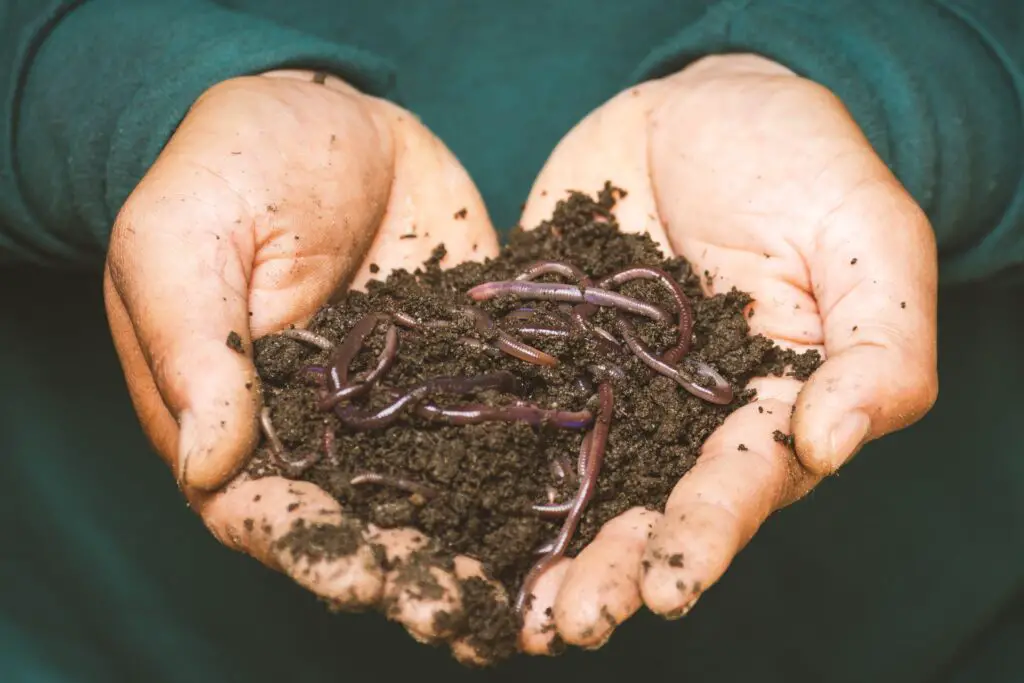(7 Reasons To Know) – Why Earthworm Is Called Farmer’s Friend? It’s benefit in agriculture and more…
Earthworm’s contribution into the life of the farmers can’t be ignored. They play a key role in organic farming.
Earthworms bring a lot of impact into the soil, just like it improves the nutrient availability to the crops, enhances the soil drainage system, reduces soil erosion, increases plant health, enhances the physical and chemical properties of the soil, improves the soil productivity, suppresses various soil-borne diseases, and also gives economical support to the farmers.
It’s due to the above organic reasons which either wouldn’t have been possible without the presence of earthworms, that encourage farmers to increase the population of earthworms in his fields.
The crops grown from earthworm containing soil are much fresher and healthier and organic than those grown using the use of excessive chemical fertilizers and pesticides.
Moreover, earthworms don’t need much to care about. If you do not have many earthworms in your soil, then all you need is to just introduce them following some of the best practices mentioned in the books of organic farming.
You will be shocked to see that it is surprising how quickly they build up in favourable conditions. Nothing much to worry about them, if your soil has all that they do need.

- 1. Earthworms improve soil health and consequently plant health
- 2. The vermicompost by earthworms suppress various soil-borne diseases
- 3. They improve the physical and chemical properties of soil
- 4. Earthworm increases the soil porosity
- 5. Earthworms secrete sticky material from its outer skin
- 6. Presence of earthworm prevents soil erosion
- 7. Earthworms help farmers to reduce their production costs
Given below are the 7 broad reasons why the earthworm is called a farmer’s friend. Let’s know about these reasons:
1. Earthworms improve soil health and consequently plant health
The soil health increases when the nutrient availability of the soil increases. When nutrient availability increases the roots of the plants are better able to consume more nutrients to increase its growth and development.
A mutual association between earthworms and the soil and the plants can be seen where each one is benefited from the other. The earthworm get its food, the soil increases its nutrients, and the plants grow/develop better.
That is they feed on bacteria and fungi growing on the dead organic matter like dry leaves, cut stems, flowers, etc. of the plants by taking them deep inside the soil.
As the earthworms population increase over time, they pull more and more residue into their burrows, helping to mix organic matter back into the soil, improving soil nutrient availability, and water infiltration rate.
Thus, it can be clearly seen that their activity affects both biotic and abiotic soil properties, in turn overall affecting the proper growth of the plants.
This suggests that earthworms stimulate plant growth predominantly through releasing nitrogen locked away in residue and soil organic matter.
In this way they increase the soil’s nutrient availability and improve the soil health and consequently plant health.
2. The vermicompost by earthworms suppress various soil-borne diseases
Vermicompost is the term used to refer to those helpful and nutrient-rich particles that earthworms give in the form of its feces (waste matter removed after digestion) after digesting organic wastes like kitchen scraps, cut pieces of vegetables, leaves, dead plants, etc.
Vermicompost is actually the product of the decomposition process using earthworm. The process of creating vermicompost is called vermicomposting, while the rearing of worms for this purpose is called vermiculture.
Vermicomposts are the best of a kind of an organic manure that a plant can have. Although these may be waste to the worms but are a rich treasure for gardeners.
Vermicompost is richer in essential plant nutrients such as nitrogen, phosphorous, and potassium than traditional compost.
Research indicates that earthworm-composted organic matter, also called vermicompost, has disease suppressive properties.
Vermicompost products have been proved to be efficient as organic fertilizers and biological control agents providing suppression on many plant disease incidences caused by soil-borne/foliar plant pathogens and pests.
For example, the vermicompost obtained from an earthworm species, Lumbricus terrestris reduces the fungus Fusarium spp. from the soil that causes a disease called Fusarium Head Blight on wheat.
3. They improve the physical and chemical properties of soil
Yes, the presence of earthworms increases the physical and chemical properties of soil enhancing more agricultural production over time.
Research has shown that these creatures can increase soil pH, organic matter content, and exchangeable cations more effectively than any other soil fauna.
Their contribution to the increase in Nitrogen and Phosphorus contents can’t also be ignored. So, they also play a key role in the nitrogen and phosphorus cycle of the soil along with the other soil-dwelling organisms.
They are also the very best to increase Copper (Cu), Molybdenum (Mo), and Manganese (Mn) content in the soil in concentrations as required for the plants.
Earthworm casts make the soil particles to stick together in water-stable aggregates. This better helps them to store moisture thus enriching the water content in the soil.
The introduction of earthworms in the agroecosystem changes soil physical properties and especially water retention and infiltration. That is in agroecosystems, it tends to decrease the soil’s infiltration rate and increase the water retention capacity.
They modify soil by burrowing, moving particles within and between horizons, forming and disintegrating aggregates, and changing porosity, aeration and water infiltration, and retention capacity.
4. Earthworm increases the soil porosity
Soil porosity is the gap between solid particles, which contains water and air. Earthworms have an important impact on increasing soil porosity in the agricultural fields.
Earthworms can increase the soil porosity because of their locomotory movement in the soil. They keep crawling in the soil and that’s what they naturally do and so due to this they better create gaps and spaces and millions of small holes in the soil which helps to percolate water and nutrition in the soil. This ultimately improves soil fertility and its structure.
Soil porosity directly contributes to the better drainage of the soil. Better drainage ensures that the soil is properly aerated.
If you have an excess of standing water it can choke your crops. So, proper drainage ensures that the water can reach every part of the soil and thus reaching every end of the plant roots as well.
Drainage reduces soil and nutrient loss from runoff and can help avoid soil erosion. Drainage on hill slopes helps to reduce the risk of soil slippage as well.
People ignore earthworms due to their small size but this small-sized animal can impact a lot as you can see.
Actually, the extensive channeling and burrowing by earthworms have concluded that soils with earthworms drain up to 10 times faster than soils without earthworms.
It is also very much important to note that, the Earthworm tunnels can also act, under the influence of rain, irrigation, and gravity, as passageways for lime and other materials as well into the soil thus overall increasing the soil productivity rate.
5. Earthworms secrete sticky material from its outer skin
It is seen that when the earthworm crawls deep inside the soil, it not only makes the spaces in the soil during its crawl, but also it naturally keeps on secreting a sticky liquid from its body.
This sticky liquid is actually a kind of an amino acid that helps to keep the small holes open.
Earthworms secrete a sticky liquid from its body which works as amino acid and it also helps to keep the small porous holes of the soil open. Thus, helping in the overall soil drainage capacity.
Earthworms always take a new path to move and they keep secreting this liquid in their path so it helps soil to absorb the vermi-wash and keep the pores in the soil active.
So, what actually is the vermi-wash? Vermiwash is a liquid that is collected after the passage of water through a soil column of earthworm action and is very useful as a foliar spray for crops.
In simple words, vermi-wash is a collection of excretory products and mucus secretion of earthworms along with micronutrients from the soil organic molecules.
If present in the soil, then these are easily transported to the leaves of the plants, shoots, and other parts via. the roots of the plants in the natural ecosystem. Thus, helping in the plant’s growth and development.
6. Presence of earthworm prevents soil erosion
As known from the soil porosity, earthworm not only increases the soil drainage system rate but also decreases the soil erosion rates.
It is thus said that earthworms have a vital role to play in preventing soil erosion by improving water absorption rates and also increasing the water content in the soil.
Topsoil which lies closest to the surface of the land contains essential nutrients for crops. So, if farmers can reduce the water runoff from the topsoil then it can decrease the risk of water erosion.
So, earthworms when they keep on crawling deep inside the soil they create pores leading to proper water drainage deep inside the soil.
This prevents more of the water to go deep into the soil and stay stored there, rather than from being simply running-off through the upper soil surface. This decreases the erosion of nutrient-rich soil.
7. Earthworms help farmers to reduce their production costs
Yes, overall if you see, earthworms can economically support farmers. Their daily activities help farmers to highly reduce crop production costs.
Just like they save a lot of money of the farmers in reducing the use of fertilizers, urea, foilar sprays, anti-fungicides, etc. They do also prevent a lot in maintaining the soil erosion as well.
Moreover, farmers doesn’t have to care much about the irrigation system as proper soil-drainage system is already being maintained by the earthworms as they can keep on increasing the soil porosity level. However, artificial irrigation facilities also needs to be used at some cases.
By their activity in the soil, earthworms offer many benefits: increased nutrient availability, better drainage, and a more stable soil structure, all of which help improve farm productivity.
And so, the farmers don’t need to buy a lot of extra things to care much about their farmlands if they can maintain the increasing population of earthworms in the soil.
That’s why it’s said, “They are not the only indicators of healthy soil systems, but their presence is usually an indicator of a healthy system.”
